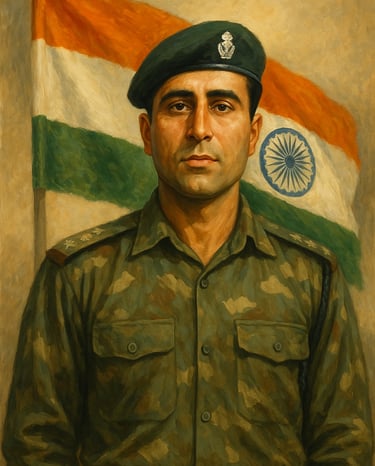Captain Vikram Batra, born on 9 September 1974 in Palampur, Himachal Pradesh, was one of the most celebrated and fearless officers of the Indian Army who laid down his life during the Kargil War of 1999, leaving behind a legacy of unmatched courage, leadership, and patriotism. Raised in a disciplined and academic family, he was a twin, affectionately nicknamed ‘Luv’, and displayed leadership traits, athletic prowess, and a keen interest in the military from an early age.
He was an NCC cadet in his college days and even represented India at the Republic Day Parade. After briefly pursuing an MBA, his true calling led him to join the Indian Military Academy in Dehradun, graduating into the 13th Battalion of the Jammu and Kashmir Rifles. When war broke out in the summer of 1999 between India and Pakistan over the high-altitude icy heights of Kargil, young officers like Batra were at the frontline. In June 1999, he led the attack to recapture Point 5140, a mission that would define his heroism. Despite heavy enemy fire, treacherous terrain, and bitter cold, he climbed up the mountain with his men, leading from the front and motivating them with sheer grit.
After a fierce gunfight and hand-to-hand combat, he secured the peak, famously radioing back the words “Yeh Dil Maange More,” which became a national war cry overnight. His leadership, calm under fire, and tactical acumen earned him national recognition, and his bravery was soon tested again in the mission to capture Point 4875, a more dangerous and heavily fortified position. On July 7, 1999, during the assault, he and his men came under intense artillery and small-arms fire. Despite being severely outgunned and facing steep vertical climbs, Captain Batra led his men once more from the front. In the final moments, he attempted to rescue a fellow soldier pinned down by enemy fire and was fatally shot in the chest. His last act was one of supreme sacrifice, as he saved his comrade while facing death head-on. For his unmatched gallantry, the Government of India posthumously awarded him the Param Vir Chakra, the highest military honor for valor in battle. The peak he helped capture, Point 4875, was renamed “Batra Top” in his memory. Captain Batra’s legacy is not just in the medals and honors he received but in the spirit he ignited among his fellow soldiers and an entire generation of Indians who saw in him the very embodiment of courage and patriotism. His life has since inspired numerous books, documentaries, and the 2021 Bollywood film “Shershaah,” where actor Sidharth Malhotra portrayed him with great emotion. The film brought his story to the younger generation, reminding them of the price of freedom and the people who pay it with their lives. Captain Batra was not just a soldier; he was a son, a brother, a friend, and a national icon. His parents, particularly his father G.L. Batra, have actively kept his memory alive by participating in events, seminars, and memorials that honor the martyrs of the Kargil War. Educational institutions, stadiums, and roads across India have been named after him, and his story is taught in military academies as a shining example of bravery. Even in his short span of service, his impact was so profound that his colleagues, superiors, and juniors all recall him as someone who could lift morale with a smile, plan with precision, and fight with unmatched tenacity. His last conversation with his brother Vishal Batra was filled with pride and concern, revealing the emotional depth behind the warrior. Captain Vikram Batra’s name is now etched in the annals of Indian military history, symbolizing raw courage, sacrifice, and love for the nation. He remains an undying flame in the heart of every Indian, a legend whose story will continue to inspire countless generations to serve the country with honor, dignity, and fearless determination. His life teaches us that heroes are not born; they are made through conviction, action, and selflessness. The mountainous terrain of Kargil may have witnessed the fall of Captain Batra's mortal body, but the echo of his voice and the strength of his actions continue to resonate through the valleys, standing as a timeless testament to what it means to live for the nation and, when duty calls, to die for it. His saga reminds every Indian that freedom is preserved not by words but by the blood of those who dare to defend it, and in that regard, Captain Vikram Batra will forever remain immortal.


